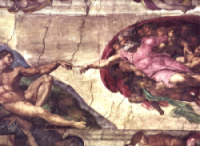 Sanctification or in its verb form, sanctify, literally means to set apart for special use or purpose, that is to make holy or sacred (from the Latin verb sanctificare, which in turn derives from sanctus, "holy" and facere, "to make".). The Greek word is hagiasmos (άγιασμος), meaning "holiness, consecration, or sanctification." It comes from the root hagios (άγιος), which means holy or sacred. Sanctification then refers to the state or process of being set apart or made holy. What is often missed, or overlooked, is the relational aspect that is associated with the word sanctification. Only God is truly holy. Everything else, whether it is things or people, is holy only because of its relationship to God.
Sanctification or in its verb form, sanctify, literally means to set apart for special use or purpose, that is to make holy or sacred (from the Latin verb sanctificare, which in turn derives from sanctus, "holy" and facere, "to make".). The Greek word is hagiasmos (άγιασμος), meaning "holiness, consecration, or sanctification." It comes from the root hagios (άγιος), which means holy or sacred. Sanctification then refers to the state or process of being set apart or made holy. What is often missed, or overlooked, is the relational aspect that is associated with the word sanctification. Only God is truly holy. Everything else, whether it is things or people, is holy only because of its relationship to God.Definition and descriptions
The concept of sanctification is widespread among religions, but is perhaps more common among the various branches of the Christian religion, especially those of the Protestant-Reformed and Wesleyan-Arminian traditions. The term can be used to refer to objects which are set apart for special purposes (i.e., the Temple vessels), but the most common use within Christian theology is in reference to the change brought about by God in a believer, begun at the point of salvation or justification and continuing throughout the life of the believer. Many forms of Christianity believe that this process will only be completed in Heaven, but some believe that complete holiness is possible in this life on earth--particularly in the final days before the ultimate return of Jesus. Some Protestants denominations call the completion of sanctification "glorification".
More...


No comments:
Post a Comment